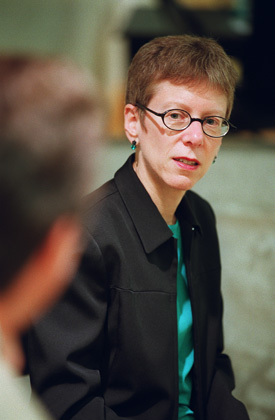 Terry Gross, recently referenced in this story involving a Jonathan Franzen interview that had been cut for broadcast, has been kind enough to respond to my questions. She informs me that “there has been no self-censorship or deals cut to suppress the Franzen interview.” Gross tells me that the audio for the original October 15, 2001 broadcast should have been available on the Fresh Air website and that she was surprised to learn that this wasn’t the case. Fresh Air has asked NPR to restore the original Franzen interview on the website, and I will follow up next week to see if it’s there.
Terry Gross, recently referenced in this story involving a Jonathan Franzen interview that had been cut for broadcast, has been kind enough to respond to my questions. She informs me that “there has been no self-censorship or deals cut to suppress the Franzen interview.” Gross tells me that the audio for the original October 15, 2001 broadcast should have been available on the Fresh Air website and that she was surprised to learn that this wasn’t the case. Fresh Air has asked NPR to restore the original Franzen interview on the website, and I will follow up next week to see if it’s there.
Gross’s email was also forthright in describing Fresh Air‘s policy concerning repeat interviews. She informed me that when an interview is rebroadcast, “we almost always shorten it.” In the case of the elided Franzen remark, the decision was made to curtail the Oprah section because it was “dated.” As to Fresh Air editing policies, Gross pointed out that all of her interviews were pre-recorded and that they are all edited before they are broadcast. She does not record anything live. “Editing is not censorship,” wrote Gross, “Editing is not unethical. Editing is part of what journalists do.”
While I agree with Gross that a certain degree of audio cleanup is necessary to ensure a professional broadcast, I still remain mystified why additional broadcasts are edited further. I also wonder why such concerns as “dated” material should even matter. After all, if the listener knows that she’s listening to an interview that aired before, why then should such a distinction matter?
I have sent Gross a followup email, pointing out that abridgment is not indicated on the broadcast and that the main page for the Franzen repeat does not read, “This is an excerpt from an October 15, 2001 interview,” but reads, “This interview first aired October 15, 2001.” Thus, the listener might insinuate that what she is hearing is the same interview that aired before. This specification would certainly put Gross in a more ethically sound position.
Nevertheless, this offers some insight into how Gross and Fresh Air operates. And I am glad that she has at least taken steps to restore the original interview. I only hope that Gross will be more forthright about how future rebroadcast interviews are edited, if only to escape an ombudsman’s wrath.
© 2007, Edward Champion. All rights reserved.
“While I agree with Gross that a certain degree of audio cleanup is necessary to ensure a professional broadcast, I still remain mystified why additional broadcasts are edited further. I also wonder why such concerns as “dated” material should even matter. After all, if the listener knows that she’s listening to an interview that aired before, why then should such a distinction matter?”
because they want to make something that they think is more interesting, that will keep listeners more interested
when i write something i edit it a lot, then after it gets accepted i edit it and other people edit it and then later on i edit it more and like a year later if i had the chance i would edit it more
the same with non-fiction
if the listener doesn’t know who oprah is 20 years from now they will get bored and go to some other website, advertisers will learn about this somehow and pay less money to them, or maybe terry gross views everything as a ‘work of art’ to be ‘refined’ as much as possible to create something new and more interesting and more beautiful, etc., there are many reasons why something would be edited down
ed,
http://www.timeout.com/newyork/article/books/1552/debut-taunt
my profile got edited out of online time out new york.
My impression is that when interviews are rebroadcast, they tend to be part of compilation shows with other previously released stuff — so you trim them down to fit more of them into a broadcast. There’s nothing unusual about that.
NPR still hasn’t posted the unabridged interview…